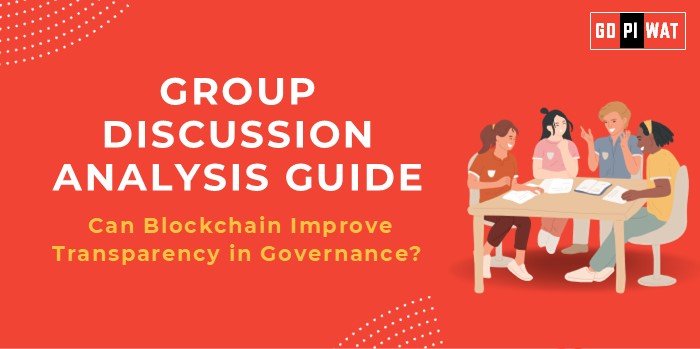📋 Group Discussion (GD) Analysis Guide: Can Blockchain Improve Transparency in Governance?
🌐 Introduction to the Topic
- 📜 Opening Context: Blockchain technology, initially developed for cryptocurrencies, has evolved into a versatile tool with applications extending into governance. Its potential to enhance transparency, accountability, and efficiency in public administration is being explored globally.
- 📖 Topic Background: Emerging from Bitcoin’s ledger system in 2008, blockchain offers a decentralized, immutable, and secure method of recording transactions. Governments worldwide are investigating its use in areas such as public procurement, voting systems, and land records to curb corruption and inefficiencies.
📊 Quick Facts and Key Statistics
- 🌍 Global Blockchain Spending in Government: Projected to reach $6.6 billion by 2025, indicating increased adoption globally.
- ⚖️ Corruption Perception Index: India ranks 93rd out of 180 countries, with a score of 39 out of 100. This ranking underscores the need for more transparent systems in governance.
- 🇪🇪 Blockchain Adoption: Estonia leads with e-governance, using blockchain to secure 99% of citizen data.
- 🇮🇳 India’s Blockchain Initiatives: States like Andhra Pradesh and Telangana are utilizing blockchain for land record management, aiming to reduce fraud and enhance transparency.
👥 Stakeholders and Their Roles
- 🏛️ Government Agencies: Implement blockchain in public services to enhance transparency and efficiency.
- 💻 Private Tech Firms: Develop blockchain platforms and provide technical expertise.
- 🙋♂️ Citizens: Benefit from transparent services such as tamper-proof records and e-governance.
- 🌍 International Organizations: Offer frameworks and case studies for blockchain implementation (e.g., World Economic Forum).
🏆 Achievements and Challenges
✨ Achievements
- 📜 Land Record Management: Blockchain-based systems in Andhra Pradesh and Telangana have been implemented to reduce property fraud.
- 💻 E-Governance: Estonia’s X-Road platform facilitates secure data exchange in e-governance systems. Blockchain is used specifically in healthcare and e-prescription data integrity.
- 📑 Public Procurement: Dubai’s blockchain system has streamlined processes, reducing paperwork and fraud.
⚠️ Challenges
- 💸 High Initial Costs: Implementation and scaling require significant investment.
- 🛠️ Technical Barriers: Lack of expertise in blockchain technology can hinder adoption.
- 📜 Regulatory Concerns: Ambiguities in legal frameworks governing blockchain pose challenges.
🌍 Global Comparisons
- 🇪🇪 Estonia: Blockchain secures 99% of citizen data, setting a benchmark for other countries.
- 🇧🇷 Brazil: Piloting blockchain systems in public health to improve transparency and efficiency.
📄 Structured Arguments for Discussion
- ✅ Supporting Stance: “Blockchain can revolutionize governance by eliminating corruption and increasing accountability.”
- ❌ Opposing Stance: “High costs and technological barriers make blockchain impractical for large-scale governance reforms in developing countries.”
- ⚖️ Balanced Perspective: “While blockchain has transformative potential, addressing cost and regulatory challenges is essential for its success in governance.”
💡 Effective Discussion Approaches
📊 Opening Approaches
- 📈 Statistical Opening: “With $6.6 billion projected global spending on blockchain in governance by 2025, it’s clear this technology is being embraced worldwide.”
- 📚 Case Study Opening: “Estonia’s success in securing citizen data with blockchain highlights its potential for transparent governance.”
💬 Counter-Argument Handling
- 💡 Highlight alternative cost-effective models.
- 📈 Emphasize phased implementation to manage high costs.
🔎 Strategic Analysis of Strengths and Weaknesses
- 💪 Strengths: Transparency, fraud prevention, improved accountability.
- ❌ Weaknesses: High costs, lack of technical expertise.
- 🌟 Opportunities: Global leadership in blockchain, enhanced citizen trust.
- ⚠️ Threats: Cybersecurity risks, resistance to change.
🎓 Connecting with B-School Applications
📊 Real-World Applications
- 🔍 Blockchain in financial governance can reduce leakages in government subsidies.
💬 Sample Interview Questions
- 💭 “How can blockchain address corruption in governance?”
- 📜 “Discuss the feasibility of blockchain adoption in developing countries.”
💡 Insights for B-School Students
- 📚 Explore blockchain’s use in finance and operations for capstone projects or internships.


